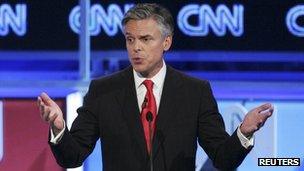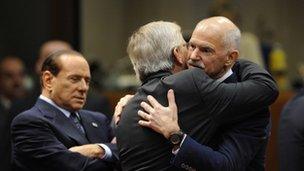Republicans ready for Europe crisis?
- Published
- comments

Jon Huntsman is a Republican candidate with a plan to deal with the crisis in Europe
The wind whistling across the corn fields cuts you to the quick despite the lingering autumnal sunshine. The weather is changing. Snow is in the air.
It will be much colder when I next come back to Iowa for the first Republican caucus on 3 January 2012.
But it is not the icy wind blowing down from the Arctic that worries me. It is the storm brewing across the Atlantic that could dramatically change the political climate.
It could test the Republican candidates' ability to think on their feet and respond to a crisis.
President Obama warned at a fundraiser last night: "We still have a lot of headwinds ahead of us. Europe is probably the biggest one.
"And I'm spending an awful lot of time making transatlantic calls, because when you look at what's happening in Europe, both to the banks and for countries like Italy that need to refinance their debt, that can have a profound impact on what happens here."
A radical plan
Those calls may be having some impact. Germany and France will unveil a new plan for the euro, external next week and there are some grounds for optimism after the intervention of the central banks and the promise of ECB action.
But so far the motto of this crisis has been "too little, too late". We will have to see if that is about to change, external.

An EU summit next week is seen as a crucial moment in efforts to tackle the debt crisis
If this all doesn't do the trick, the 2012 election could be fought not against the backdrop of the fallout from the last economic crisis, but the impact of the next one.
That would be a test for Republican candidates who did not mention the eurozone once in their last debate on national security. The indications are they are none too keen on bailouts.
Jon Huntsman, external has recently earned praise for his radical plan, external to downsize banks.
Ron Paul has attacked the move by the central banks as panic and buying up bad debt. He too thinks there should be no such thing as "too big to fail".
But there is little other hint of how the Republicans would react to the European crisis. Of course, you can argue it is none of their business. But if the eurozone falls apart it will become their business.
Intriguing ideas
I am in Iowa to do a film for the BBC television programme Newsnight and one of the things I wanted to explore is whether the candidates' economic policies fit the mood of a country apparently clamouring for growth and jobs.
At a small meeting in Des Moines, I listened to former Speaker of the House Newt Gingrich come up with some intriguing ideas, such as cutting medical fraud by using the same systems as credit card companies. But his economic prescription, external is simple.
Cut taxes, cut red tape and encourage the spirit of enterprise. That, he suggested, would create 25 million jobs in seven years.
But seven years is a long time. All the candidates prescribe much the same medicine. Only the dosage differs.
Senior Republicans I have spoken to in the state candidly admit that the programme of cutting the deficit and rolling back the state cannot create jobs overnight.
They argue that it will, eventually, create the right climate for job creation and that the public has to be grown-up enough to take the long-term view.
That may be a tall order in a country keen on instant solutions. But how they coped with any new crisis would be test of a different order altogether.